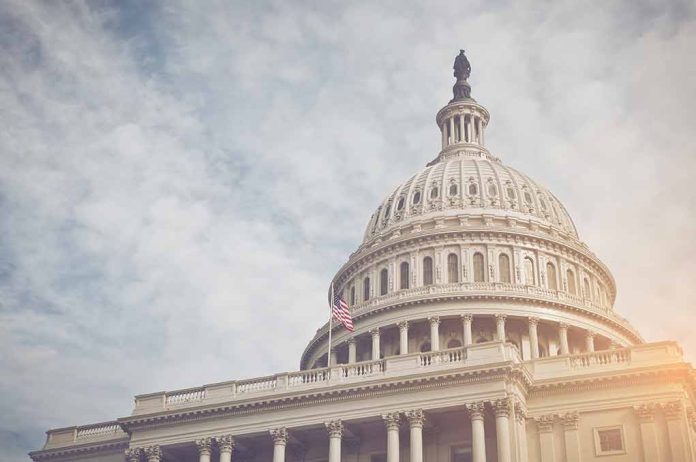
As tensions rise between the United States and Iran, Congress remains silent on its war powers, potentially paving the way for unchecked military action.
At a Glance
- U.S.-Iran relations have been strained since the 1979 Iranian Revolution, with tensions escalating since 2023
- Iran supports regional armed groups like Hamas and Hezbollah, challenging U.S. influence in the Middle East
- Congress has not invoked its war powers despite increased military presence in the region
- The 2001 Authorization for Use of Military Force (AUMF) allows broad executive military actions without geographic limits or expiration
- Efforts to reform war powers have stalled, raising concerns about unchecked presidential authority
Escalating Tensions and Congressional Inaction
The United States and Iran find themselves at a critical juncture, with tensions reaching alarming levels following recent Iranian airstrikes on Israel. Despite the growing risk of military conflict, Congress has remained notably silent, failing to exercise its constitutional war powers. This inaction raises serious concerns about the potential for unchecked military escalation and the erosion of legislative oversight in matters of war.
The relationship between the United States and Iran has been antagonistic since the 1979 Iranian Revolution, with tensions significantly increasing since 2023. Key concerns for U.S. policymakers include Iran’s regional activities, human rights violations, nuclear program, and strengthening ties with Russia and China. Iran’s support for regional armed groups like Hamas and Hezbollah, aimed at eroding U.S. influence in the Middle East, has further complicated the situation.
The Expanding Scope of Executive War Powers
In the aftermath of the 9/11 attacks, Congress enacted a broad use-of-force authorization, which has been heavily relied upon by successive administrations for military actions against al-Qaeda and its affiliates. The 2001 Authorization for Use of Military Force (AUMF) has been interpreted expansively, allowing for military operations with no geographic limits or expiration date. This broad interpretation has enabled the executive branch to conduct military actions globally without seeking additional congressional approval.
The Constitution divides war powers between the legislative and executive branches, but over the decades, the executive’s role has expanded significantly. This shift in power dynamics has led to a situation where the President and the executive branch appear ready to engage militarily without seeking formal congressional approval, relying instead on existing authorizations as justification.
Challenges to Congressional Oversight
Congress faces several obstacles in reasserting its war powers and improving oversight of military operations. The executive branch often withholds or delays information about military actions, hindering Congress’s ability to make informed decisions. Additionally, the War Powers Resolution of 1973, aimed at limiting executive warmaking, has been weakened by executive interpretations and court decisions.
Political incentives and public inattention have contributed to Congress’s acquiescence in diminished war powers. While Congress has options like denying funding to stop wars, these measures are rarely used. The complexity of modern conflicts and the rapid pace of military decision-making have further complicated legislative oversight.
The Need for Reform and Improved Oversight
Experts and lawmakers are sounding the alarm about how unchecked presidential power could defy constitutional directives, leading to risks of single-handed military escalation and potentially resulting in new “endless wars.” To address these concerns, Congress needs to reclaim its constitutional prerogatives by improving oversight and obtaining better information about military operations.
Incremental measures to enhance congressional oversight and information flow are necessary, even if major legislative reforms prove challenging. This could include more frequent briefings, improved reporting mechanisms, and stricter interpretation of existing authorizations. By taking these steps, Congress can better fulfill its constitutional role in matters of war and peace, ensuring that military actions align with the nation’s interests and values.
As the situation with Iran continues to evolve, the need for robust congressional involvement in shaping U.S. policy becomes increasingly critical. Without proper oversight and checks on executive power, the risk of unintended escalation and prolonged conflict looms large, underscoring the urgency of addressing this constitutional imbalance.
Sources:
- https://www.congress.gov/bill/118th-congress/senate-joint-resolution/106
- https://crsreports.congress.gov/product/pdf/R/R47321
- https://news.usni.org/2024/09/10/report-to-congress-on-iran-and-u-s-policy-5
- https://www.crisisgroup.org/united-states/006-stop-fighting-blind-better-use-force-oversight-us-congress
- https://www.aei.org/foreign-and-defense-policy/on-iran-this-is-the-oversight-that-congress-must-do/
- http://schakowsky.house.gov/issues/iran
- https://www.govinfo.gov/content/pkg/CHRG-116hhrg36742/html/CHRG-116hhrg36742.htm
- https://scholarship.law.wm.edu/cgi/viewcontent.cgi?article=3914&context=wmlr
- https://www.cia.gov/readingroom/document/cia-rdp90m01264r000100020026-8
- https://www.washingtonpost.com/politics/2021/03/09/war-powers-biden-has-pushed-both-more-congressional-oversight-broad-presidential-authority/










